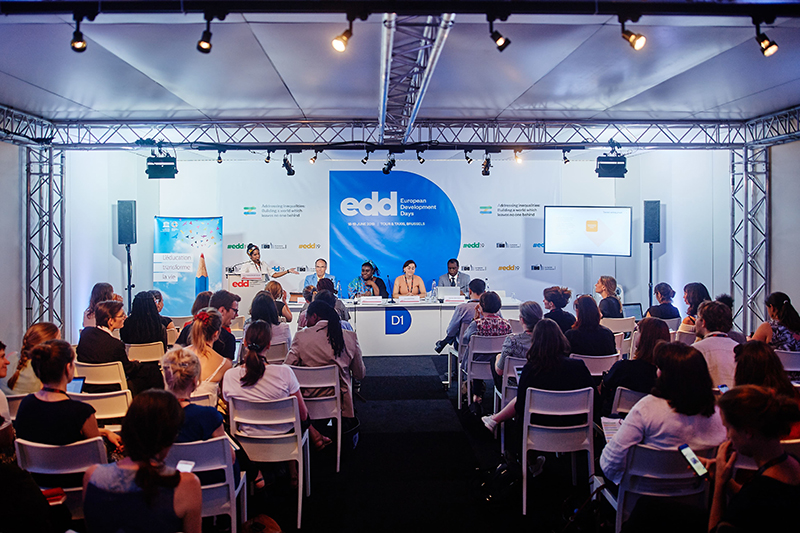Realising inclusive and equitable education for all will not be possible without teachers who are supported, empowered and provided adequate training. This is why, throughout 2019, the Teacher Task Force (TTF) continued to work in advancing teacher and teaching issues, as well as supporting countries to develop robust teacher policies. Here are some of the highlights of what we achieved in 2019.
Calling for greater investment in the teaching profession
The Teacher Task Force contributed to key fora and events during the year to make the case for teachers at the global level.
The Head of the TTF Secretariat called for greater investment in teachers in an op-ed featured in the 2019 Commonwealth Education Report. This call was reiterated through the TTF support to the #CommitToEducation campaign launched during the High-Level Political Forum in July 2019. We also made the case to invest in young teachers during World Teachers Day on 5 October.
Putting the teaching profession at the centre of education
TTF Members also regularly collaborated throughout the year to ensure teachers featured high on the education agenda, notably through the TTF’s thematic working groups.
During the 2019 Mobile Learning Week, the TTF thematic group on ICT and distance education held a debate on the impact of Artificial Intelligence on teacher education and teaching practices. This debate brought together a variety of education stakeholders and helped shape the conversation, with a clear takeaway that AI cannot replace a teachers’ presence in the learning environment.

The Thematic Group on inclusion and equity in teacher policies and practices also contributed to discussions on inclusive and equitable education. The TTF organised a panel highlighting the importance of teachers in inclusive and equitable school settings during the European Development Days held in Brussels in June. Panellists highlighted the critical influence teachers have in creating safe and inclusive learning environments.
In December 2019, members of the TTF Thematic Group on early childhood education and care convened a conference mobilizing over 200 participants, including from 18 African countries, that put teacher issues front and centre in ECE discussions. The conference resulted in the Casablanca Declaration and Call for Action, which recognised that ensuring quality training and professionalization for ECE teachers and educators, as well as decent working conditions, is a priority for achieving SDG target 4.2.
The TTF also convened its 12th annual Policy Dialogue Forum (PDF) in December in Dubai (United Arab Emirates) under the theme “The Futures of Teaching”. The PDF was attended by some 250 international and 80 national participants, which included seven Ministers of Education from different regions, and has received positive feedback. One of the country delegates attending the PDF stated that “the Forum workshop came at the right time, (…) it allowed me to identify the various gaps that exist in the management of our teachers and even in the development of our teaching policy and to propose to the various officials at the Ministry level the necessary adjustments”. The key conclusions and recommendations of the Forum were summarised in the Dubai Declaration on the Futures of Teaching.
Improving regional engagement
The Teacher Task Force also strengthened its work at regional level, through a series of member consultations throughout the year, with positive impacts, such as the Caribbean Community (CARICOM) officially becoming a member of the Teacher Task Force.
The regional meetings highlighted the strength of the TTF in providing its members with a space where they could come together and collectively reflect on teacher issues from their respective points of view, taking into account particular national and regional contexts. Members were encouraged to continue cooperation and communication throughout the year, and this work will continue to be strengthened in 2020.
Looking ahead to 2020
Following a fruitful year, the Teacher Task Force will keep up its advocacy work at global and regional levels in 2020, ensuring that teacher and teaching issues remain high on the Education 2030 and SDG agendas throughout the new decade.
The TTF will also launch a new online Knowledge Platform in 2020. The goal of this web-based portal is to facilitate the exchange of knowledge, expertise and experiences on different dimensions of the teaching profession among TTF members and partners, and become a key resources for all those working on teachers and teacher policy development.
With the release of the online Teacher Policy Development Guide training courses, developed in collaboration with the Open University UK, the TTF Secretariat will also continue to work with its members to broker support for countries who are in the process of developing, implementing and monitoring national teacher policies.
The Teacher Task Force will continue to contribute to several initiatives at global and regional levels to advance the cause of the teaching profession in 2020.